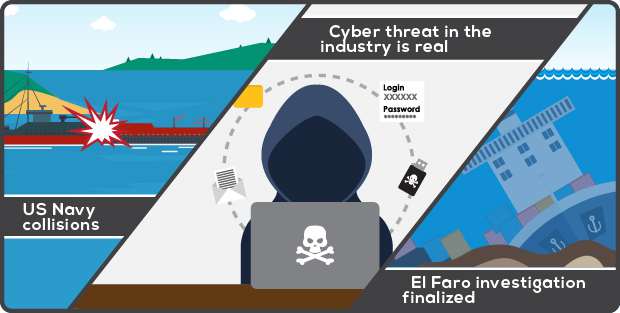As 2017 is reaching its end, we can’t stop wondering about the future of shipping industry in 2018. But first, let’s have a look at the stories that our readers were most interested in.
The following issues may have been either popular reads in 2017 or captivated high attention among the industry. Overall, major challenges mixed with significant developments made 2017 an interesting year as well for the maritime industry. The agenda included from rise of technology trends and vessel automation, to cyber security issues and piracy revival.
Autonomous shipping and digitalization are currently the ‘buzz’ words around us; however, many things need to be considered about these issues and the industry continues to discussing a lot about them. Certainly, these are the new trends in the spotlight and more developments are looming in the forthcoming years to make the smart shipping concept a reality. However, the ‘smart era’ escalates cyber security risks; in 2017 shipping industry reported the first significant cyber incidents which rang the bell for this new kind of threats.
Cyber threat is real
On 27 June, the Danish shipping giant A.P. Møller-Maersk, operating the biggest container fleet in the world, announced that its IT systems were out of work due to a hit by hackers, which brought disruption to global operations across the supply chain, as well as financial loss at the company estimated at USD300 million. NotPetya was a previously unseen type of malware that affected at the same time Ukrainian and Russian companies, including Russian oil company Rosneft.
Maersk admitted that its anti-virus software was not effective against this new type, which brought a wider concern in shipping and logistics companies regarding their cyber security alertness.
Singapore-based BW Group and UK based Ship-Brokers Clarksons were also reportedly targeted by computer hackers.
These incidents confirm that all industry’s discussions to raise awareness and enhance security are worth the effort.
At a glance
During 2017, the following significant initiatives took plance in a bid to take proactive meausures:
- IMO MSC 98 approved MSC-FAL.1/Circ.3 ‘Guidelines on Maritime Cyber Risk Management’ which refer to ship owners as guidance and remain non-compulsory.
- The meeting also adopted Resolution MSC.428 (98) on ‘Maritime Cyber Risk Management in Safety Management Systems (SMS)’. According to the Resolution, an approved SMS should take into account cyber risk management in accordance with the objectives and functional requirements of the ISM Code.
- Additionally, the second edition of “The Guidelines on Cyber Security Onboard Ships”was released, including information on insurance issues and how to effectively segregate networks, as well as new practical advice on managing the ship to shore interface, and how to handle cyber security during port calls and when communicating with the shore side.
- BIMCO, ICS and MPA Singapore launched a new cyber security awareness poster summarizing simple steps for everyone to avoid cyber incidents.
- CSO Alliance coalition gathered industry leaders including BIMCO, DNV GL, Marshall Islands, Airbus Defence and Space and North P&I Club to combat cybercrime.
- 99% of the cyber-attacks occur because we fail to do the basics, noted the ‘Be Cyber Aware at Sea Campaign’ which released a short filmto advice maritime industry to take simple steps.
- IACS formed a joint working group to develop a coordinated position on cybercrime and its prevention. Classification societies can help to remove barriers, speed up the process, and assist stakeholders make the most of the new landscape, IACS Chairman Knut Orbeck-Nilssen Said.
- Law firm Norton Rose Fulbright released a report revealing that over the next five years, an increase in cyber-attacks is expected due to digitalization.
- UK launched ship cyber security code of practisefor ships for use in conjunction with organisation’s risk management systems and subsequent business planning.
Many stakeholders stressed that cybersecurity needs to become a priority for each organization and shipowners and managers need to get onboard with the new risks and work to address the cyber needs of their people, clients, vessels and shore management effectively.
Autonomous ships developments
In a bid to adapt to the changes of the maritime industry, many shipping leaders from the private sector, as well as governments and organizations, have backed research and promotion of autonomous vessels, which are considered as a solution to human error-related accidents.
North European countries proved particularly supportive to the development of autonomous maritime operations.
Norway opened this year two more test bed areas for testing of autonomous vessels, in Horten and in Storfjord, after the first at the Trondheim fjord, in late 2016. Finland also inaugurated in late summer the… (Read More) Source; https://www.safety4sea.com/countdown-the-top-shipping-stories-of-2017/

